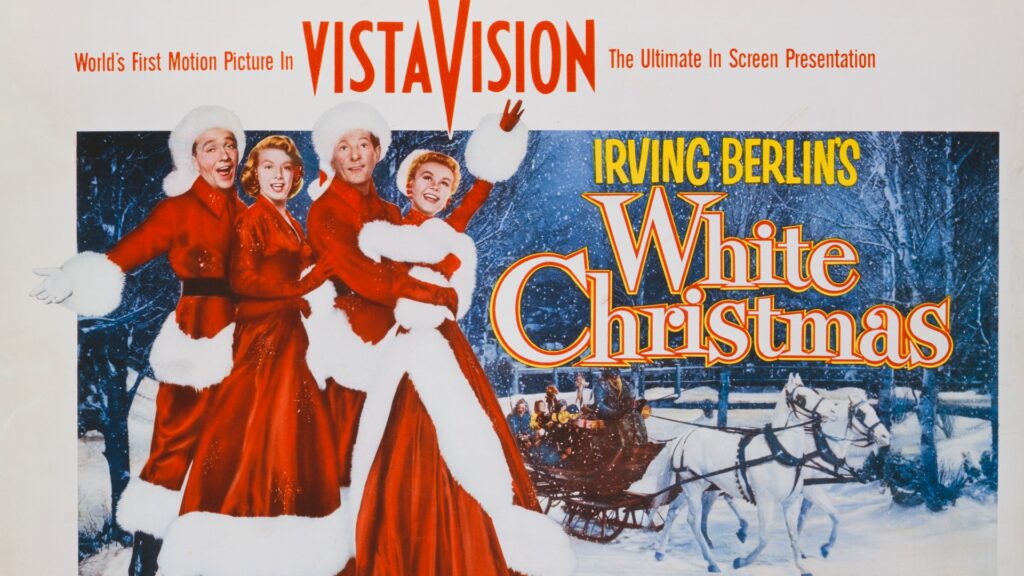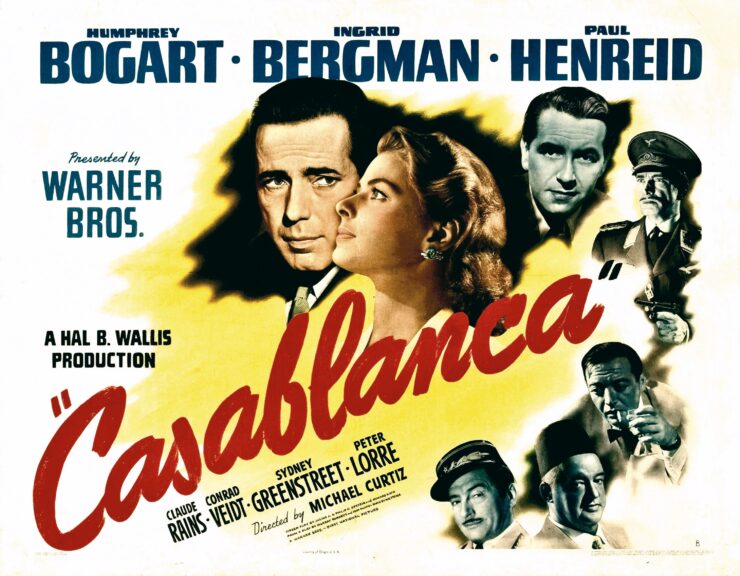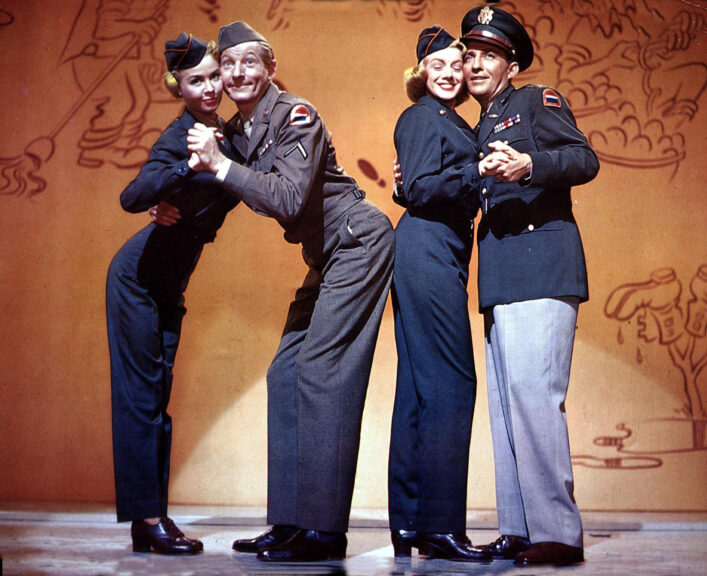After 70 years, it’s time to start taking “White Christmas” seriously.
Few will deny that the 1954 musical is a classic Christmas movie, but no one would call it a “classic” in the same vein as “It’s A Wonderful Life.” Frank Capra’s meditations on morality lend themselves to serious thoughts; Bing Crosby crooning his way through Irving Berlin ballads and Danny Kaye pratfalling all over the Technicolor sets, not so much.
But beneath all the schmaltz and snowfall, “White Christmas” is a realistic depiction of a country and people struggling to return to normalcy after years of war and conflict. Its willingness to confront that transition — as well as the social and commercial adjustments it requires — make it not only a true classic, but the perfect Christmas movie for the present.
“White Christmas” is the story of Bob Wallace and Phil Davis, World War II veterans turned successful entertainers who find themselves spending Christmas at a struggling Vermont inn owned by their former commanding officer, General Tom Waverly. With ample song and dance, Wallace and Davis manage to save the inn, romance a pair of singing sisters, and put on a spectacular Christmas show that ends with the titular song, just as the first snow of the season begins to fall.

Photo by Movie Poster Image Art/Getty Images
Yes, it’s fluffy. But beneath that fluff is a story of transitions. Career soldier Waverly can’t make peace with peacetime, and tries to trade his pipe and slippers for a new commission. Wallace has done a better job adjusting to postwar life, but only because he’s thrown himself into work, much to the chagrin of Davis, who urges his partner to settle down and start a family.
This is really what “White Christmas” is all about. Think of it this way: the film only has one song about Christmas, but two songs about how hard it is for soldiers to adjust to civilian life.
That fact alone is enough to make us consider that “White Christmas” is about more than seasonal merriment — especially considering the film’s director.
Michael Curtiz is best known for “Casablanca,” an epic tale of love and loyalty at the height of World War II. While the two films don’t seem to have a lot in common, “White Christmas” actually serves as a quasi-sequel to “Casablanca.” So, in order to understand what’s really going on with Wallace and Davis, we have to look back to Rick and Ilsa.

(Photo by LMPC via Getty Images)
Like “White Christmas,” “Casablanca” is set in the same year it was released. So, contemporary audiences would have seen each film as a commentary on their lives.
With “Casablanca,” that commentary was a call to arms. The film is famously stirring, so much so that the U.S. Office of War Information prevented troops stationed in North Africa from seeing it out of fear it would incite violence against Vichy supporters in the area. And the Bureau of Motion Pictures determined that “Casablanca” would help the Allies win the war by effectively showing “that personal desire must be subordinated to the task of defeating fascism.”
“Casablanca” isn’t just another war movie. It’s the ultimate war move, in that it drummed up support for the same war it depicted. Similarly, “White Christmas” is more than just a “feel-good” movie. It’s a peacetime movie, one that eased its audience back into normalcy by offering them a step-by-step guide to that end, and showing how happy their cinematic contemporaries were made by following that guide.
Early on in the film, Wallace begrudgingly admits his debt to Davis for convincing him to get into show business after leaving the army, snapping, “We did great, and I’m grateful!” Later on, the film reaches its emotional climax with Bing Crosby’s famous rendition of “Count Your Blessings (Instead Of Sheep).”
You’d be hard pressed to find a better metaphor for prosperity than an abundance of blessings so large, you can toss them off as you’re nodding off. But nowhere is this point better made than at the end of the film, when Wallace and Davis have reunited the members of the 151st Division to surprise General Waverly on Christmas.
Everyone’s happy. Most brought their families. Those whose careers we hear about are wildly successful. And at least one soldier has gotten so pleasantly plump that he can’t fit into his uniform, which gives the whole squad a good chuckle.
CHECK OUT THE DAILY WIRE HOLIDAY GIFT GUIDE
This is the point of “White Christmas.” That it’s okay be okay, to be successful and happy, even — especially! — shortly after a period of national tumult. Captain Wallace’s patriotism is not minimized by the fact that he became a successful entertainer, nor is his professional success minimized by his ultimate decision to settle down. He earned both turns, as did everyone else we meet in the film.

(Photo by FilmPublicityArchive/United Archives via Getty Images)
Once we understand the central message of “White Christmas” — that you can and should embrace the comfort and normalcy that follows strife — we can appreciate what a serious film it is. First and foremost, it’s Curtiz’s answer to “Casablanca,” a balm for the people whose wartime passions he had only recently inflamed.
It’s also an ideal Christmas movie in the truest sense. Though it’s surprisingly light on the holiday’s commercial trappings, “White Christmas” is about the promise of a new start for humanity. The soldiers become singers, the singers become fathers. The wolf shall live with the lamb, and all that.
This was an essential message for postwar America. But it’s equally important today. Now as then, our country stands on a precipice. We’ve been fighting for years — about politics, culture, education, and more. For a time it seemed like we would never again return to normal.
But now, the opportunity to get back to normal is here. Yes, our country may be divided, and there are certainly many important fights worth having. But with a monumental election behind us, we now have an opportunity to turn away from the fray and focus on the things that matter.
“White Christmas” reminds us what those things are, and urges us to pursue and celebrate them.
The summer brought two presidential assassination attempts and as many Democratic presidential candidates. Let’s let the winter bring comfort and joy, promise and rebirth, and so many blessings you just can’t help but sing about them.


